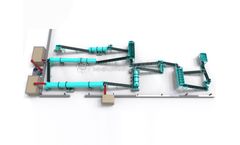Reduce Fertilizer Use Articles & Analysis
10 news found
A reasonable amount of fertilizer can improve production efficiency, so by using organic fertilizer granulators, manufacturers can ensure that the size and shape of fertilizers are uniform, which can make the land digest faster, accelerate the combination of organic fertilizers and the ground, and ensure uniform ...
The benefits of precision irrigation should not be underestimated – it can help growers produce higher quality produce with improved taste and shelf life, as well as reducing water and fertilizer use and lessening salt build-up. Netafim and Delta-T make a great team, providing expert installation and support to growers who want to benefit ...
The benefits of precision irrigation should not be underestimated – it can help growers produce higher quality produce with improved taste and shelf life, as well as reducing water and fertilizer use and lessening salt build-up. Netafim and Delta-T make a great team, providing expert installation and support to growers who want to benefit ...
” “With less use of fertilizer, the rice plant is sturdy, does not lodge, and is less prone to diseases such as sheath blight so use of pesticide is reduced,” says Zhong. ...
” Martin Gummert, key scientist at the Postharvest and Mechanization of the Closing the rice yield gaps with reduced environmental footprint (CORIGAP) project,said the training could help trigger the awareness and use of laser leveling technology in the farmers fields of participating project countries like Myanmar, Indonesia and Thailand. ...
Feed the crop not the soil’ is the message of a new review into sustainable phosphorus use. Currently, phosphorus fertiliser is applied to the soil, and plants then take it up through the roots. However, more precise nutrient management is needed on farms, the researchers say, so that the phosphorus is targeted at the crop just as it needs it. Modern agriculture is dependent on phosphorus, ...
Efforts to increase food production are clashing with efforts to reduce agriculture's greenhouse gas emissions says a group of international scientists. Agricultural research to improve food security often depends on technology to increase yields and crop intensification -- resulting in greenhouse gas emissions that damage the environment and help increase climate change, an independent ...
They are introducing vertical farming in greenhouses that will be located in cities and suburbs on unused land, empty lots or even roof tops, growing vegetables and berries vertically to produce six to eight times the productivity as conventional agricultural. By using greenhouses and combining organic farming with vertical growing methods, they drastically ...
This grant, combined with an additional $5,205,172 in matching funding from various sources, will bring together a multidisciplinary group of engineers, plant scientists, economists and extension specialists to develop the next generation of tools to precisely monitor plant water use, allow for better control of irrigation water applications and increase the efficiency of water ...
Nitrogen fertiliser used in crop production is a substantial source of environmental pollution, contributing to around one third of the total greenhouse gas emissions from the world's agricultural sector. Recent research on a genetically modified (GM) variety of rapeseed, which has been made more nitrogen-efficient, suggests that yields comparable with conventional varieties can be obtained using ...







